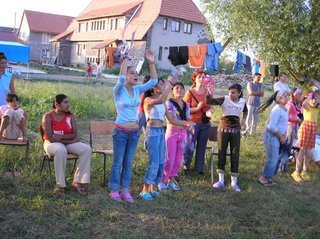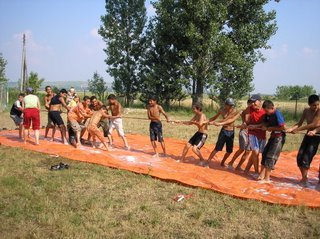Keith Kraft, a United Church of Christ pastor from Mobridge, South Dakota (USA), arrived last week with his wife Debbie, a family and consumer science instructor, to serve at a summer camp for Roma children alongside Attila and Livia Tomes from the Reformed Roma Center in Csonkapapi, Ukraine. The camp provides weeklong programs from June through July for nearly 400 youth from several surrounding communities.
For Keith, this trip is one part of a ministerial sabbatical from his pastoral duties at United Congregational United Church of Christ in Mobridge. He said that another UCC mission couple working with Roma in Poland turned them onto the idea of serving with Roma. "We wanted to do a sabbatical with a mission focus and thought the Roma sounded similar to what we deal with," Keith said. Mobridge is a town that borders two large Native American reservations in South Dakota, the Standing Rock and Cheyenne River Indian reservations. Relations between Native Americans and their white neighbors are an important aspect of the United Congregational UCC's life and ministry.
Keith: "What interested us – with bordering two Native American reservations and seeing the challenges between white and Native American cultures, the differences and the challenges – is seeing what similarities and dissimilarities there might be between the major culture in Hungary and their challenges, and the Roma," Keith said. "For me personally, it's coming to experience a different culture...to spend some time not as a tourist, but to experience people where they live. Getting to know people as people."
Debbie: "Part of that is being of service – being helpful. However we work is fine as long as we're helping with the cause."
Keith: "I think another thing too is coming to learn. It goes both ways. Learning from the Reformed Church in Hungary, but also to share our story as well, and I think through communication we can learn from each other. It's not just a one-way street. It goes both ways."

When describing their community in Mobridge:
Debbie: "We live in an area of high poverty, hopelessness, live for today (attitudes) – and how do you minister to people whose understanding is different?"
Keith: "There's so much difference between the white culture and the Native American culture. The white culture values things like ownership and time; we're structured by time. And the Native American culture is very 'well, when we get around to it, we'll do it. Nobody owns anything we share.' I see that as some of the similarities between what we're experiencing and what they're experiencing; so far, from what I've learned. There are some of those same challenges with the Roma. My ministry, I really feel, begins with a ministry of presence."

According to Keith, this ministry of presence includes providing communion at the local care-center for his congregation and members of sister churches from the Dakota Association, and also helping Native American pastors with hospital visits in Mobridge, because some of them are located 50 to 100 miles away.
When asked about an expectations or apprehensions they had going into their time in Ukraine, they said the biggest apprehensions were communication, cultural sensitivity and trust.
Keith: "There's a lot of trust that has to go both ways in this. Culturally, wanting to be proper in culture, not to disrespect unintentionally, because we value other people's culture."
Debbie: "For me one of the big things has been this idea of trust. We can't know everything exactly to the tiniest detail – we can't understand everything that is around us, but we have to trust in God that things will work out the way they're supposed to. And they have to trust that God is sending them people who will be useful and won't be a distraction. We don't want to be a distraction. We don't want to take away from that ministry; we want to assist in that ministry."
Keith: "We're not here to take away, but to be of some use, and again, to learn and hopefully have them learn from us."
Amy Lester
*Photos from the Reformed Roma Center's blog page